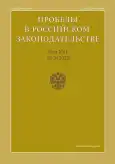Criminal Procedure (Modern Interpretation): Concept and Essence, Content and Form, Goals and Objectives
- Authors: Lozinsky O.I.1
-
Affiliations:
- Presidential Academy of National Economy and Public Administration
- Issue: Vol 16, No 5 (2023)
- Pages: 403-409
- Section: Criminal Law Sciences
- URL: https://journals.eco-vector.com/2072-3164/article/view/568918
- EDN: https://elibrary.ru/ZJTOBY
- ID: 568918
Cite item
Abstract
The purpose of the study. The article analyzes the conceptual apparatus that has historically developed in the domestic criminal procedure science, which reflects and expresses the understanding of the social purpose of the criminal process in our country, as well as its structure and principles of action. Conclusions. In the conditions of an unfavorable external environment, and even in connection with it and despite its negative impact, there is still a reasonable need for lawmaking in the criminal procedure sphere. In the current situation, it is not scientific energy and research that lead to innovations in the field of practical lawmaking, but on the contrary, the dynamics of lawmaking based on empirical necessity leads to the need for subsequent scientific and theoretical justifications of the legislative changes made. The meaning of the criminal process is defined in presenting to society the fact of the existence of a crime event and focusing its attention on it, and then using specific procedural procedures to bring the "disturbance" in the system of public relations into a state of "calm" and balance (while the process of restoring balance itself is a "calming" means, and the restoration of provides for both the full restoration of the violated right directly, and the adoption of various kinds of compensatory measures). In general, the purpose of the criminal process is formulated as the need for organizational registration and step-by-step support of the dispute process of the parties that arose in connection with the commission of a crime (while the results of the goal are: protection of the rights and legitimate interests of individuals, organizations, society and the state from criminal encroachments; protection of the individual from illegal and unjustified charges, convictions, restrictions on her rights and freedom). The realization of the purpose of the criminal process is complex, interdependent, step-by-step. The purpose, purpose and objectives of the criminal process are homogeneous in meaning and essentially interrelated concepts related to the field of goal-setting. Within the framework of the conducted research, the author's definition of the criminal process is formulated.
Taking into account what is stated in this article, the urgent need to reform the conceptual system of criminal procedure is justified, various concepts and author's definitions of concepts in this area are given.
Full Text
About the authors
Oleg I. Lozinsky
Presidential Academy of National Economy and Public Administration
Author for correspondence.
Email: oleg.lozz@yandex.ru
SPIN-code: 3389-3371
Scopus Author ID: 1207162
Cand.Sci.(Law), Associate Professor of the Procedural Law Department, South Russian Institute of Management – Branch
Russian Federation, Rostov-on-DonReferences
- Naumov K.A. Goals and objectives (purpose) of the criminal process // Siberian Legal Review. 2020. Vol. 17. No. 3. pp. 386-393.
- Naumov K.A. The essence and construction of pre-trial proceedings in the criminal process of Russia // Dissertation for the degree of Candidate of Legal Sciences. Siberian Law University. Omsk. 2021.
- Spirin A.A. Public interest in criminal proceedings // Bulletin of the East Siberian Institute of the Ministry of Internal Affairs of Russia. 2019. No. 1 (88). pp. 91-104.
- Mozgovenko S.D. The modern purpose of the criminal process in the Russian Federation. Magazine NOVAUM.RU . 2021. No. 34. pp. 93-96.
- Vekhov V.B. Planning an investigation of fraud using payment cards // Edition of the Bauman Moscow State University. 2022. pp. 92-96.
- Criminal proceedings. Textbook in schemes and definitions. M. University Library. ONLINE. pp. 46-57.
- Millerov E.V. On the need to tighten the legal responsibility for prostitution // North Caucasian Legal Bulletin. 2022. No. 3. pp. 160-166.
- Hajiyev H.I. The right to a fair trial // Russian justice. 2022. No. 5. pp. 75-80.
- Daulet K.B. The essence of the adversarial principle in the pre-trial and judicial stages of the criminal process // Law and order: history, theory, practice. 2018. No. 1(16). pp. 43-46.
- Abaydullina E.M. Correlation of the concepts of "criminal process" and "criminal proceedings" // Pero nauki. 2020. No. 26. pp. 21-24.
- Timofeev A.V. Respect for the honor and dignity of the individual in criminal proceedings // Collection of articles of the III International Scientific and Practical Conference. Petrozavodsk. 2022. pp. 14-19.
Supplementary files











